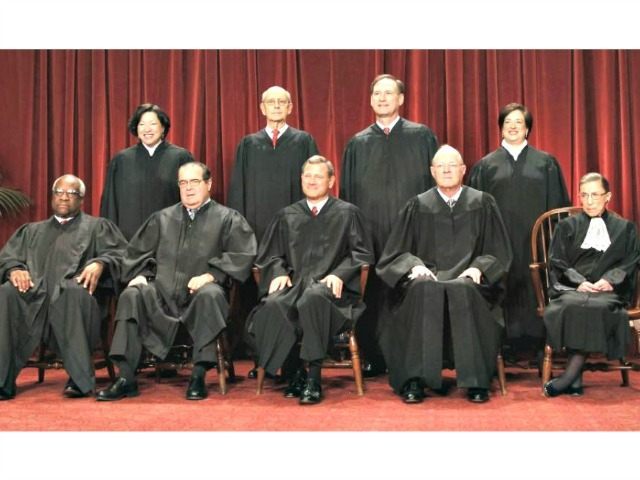The U.S. Supreme Court took different paths in two rulings delivered Thursday on cases concerning the First Amendment’s right to freedom of speech.
In Walker v. Texas Division, Sons of Confederate Veterans, the issue was whether the content on state-issued specialty license plates should be considered free speech and protected from government oversight. The case centered on the state of Texas’s rejection of a license plate design, proposed by the Sons of Confederate Veterans, which featured a Confederate flag.
Justice Clarence Thomas joined the majority, consisting of Justices Stephen Breyer, Ruth Bader Ginsburg, Elena Kagan, and Sonia Sotomayor, to make the ruling a 5-4 decision. The justices reversed the Fifth Circuit’s decision that held Texas’s specialty license plate designs are private speech, and found that the First Amendment does not apply in the case of license plates, since the content on state-issued plates is “government speech,” which, according to the decision, is not protected by the First Amendment.
Writing for the majority, Breyer likened the license plates to other public monuments, stating:
The governmental nature of the plates is clear from their faces: the State places the name “TEXAS” in large letters across the top of every plate. Texas also requires Texas vehicle owners to display license plates, issues every Texas plate, and owns all of the designs on its plates. The plates are, essentially, government IDs, and ID issuers “typically do not permit” their IDs to contain “message[s] with which they do not wish to be associated”… Third, Texas maintains direct control over the messages conveyed on its specialty plates, by giving the Board final approval over each design.
Justice Samuel Alito, Jr. wrote a dissent that was joined by Chief Justice John Roberts and Justices Anthony Kennedy and Antonin Scalia.
Writing at SCOTUSblog.com, Lyle Denniston called Alito’s dissent “strongly worded,” and said the Justice argued “that people seeing cars and trucks passing by on the roads definitely do not read license plate slogans as the government speaking, given the immense variety of what Texas has allowed to be said on those plates.”
In the case of Reed v. Town of Gilbert, Arizona, the High Court placed substantial restrictions on ordinances regarding signs and billboards, deciding that limiting signs based on their content is discrimination.
Writing for the majority, Justice Thomas was supported by Chief Justice Roberts and by Justices Alito, Kennedy, Roberts, Scalia, and Sotomayor.
According to Alliance Defending Freedom (ADF), which argued for the plaintiff, Pastor Clyde Reed, the Town of Gilbert placed restrictions on the pastor’s temporary church signs solely because of their content.
“While the town’s sign code generously permits an array of political, ideological, and other types of temporary signs, it severely restricts the size, location, duration, and number of signs like Pastor Reed’s inviting people to a church service,” stated ADF, adding that the town attempted to justify its restrictions based on sign appearance, for the sake of aesthetics, and on safety, but only restricted Reed’s signs and not others.
ADF senior counsel David Cortman argued that restricting signs based on their content is discriminatory and violates free speech as granted by the First Amendment of the Constitution. The Court’s decision, states ADF, prohibits the government from discriminating against signs based on content and from valuing one form of speech over another.

COMMENTS
Please let us know if you're having issues with commenting.